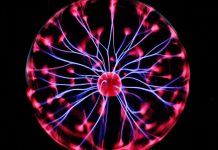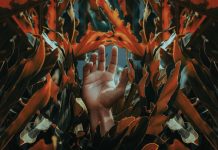Tower of Aspiration
Death may come this evening.
I’ve been climbing a hill,
the knees of my pants are torn
from crawling, and through
the years I’ve had to pause
many times from lack of strength.
On the grounds of the grand tower
that glitters like the mirrors of
Shahzade Fazel Holy Shrine
in Iran, there are people in
glamorous evening wear,
but I am not in Iran,
I am on the hill of desire,
nearing the great tower, and I think
there are fashionable people waiting
for my arrival. I hope they are not
getting impatient since my pace
is slow and the weather is bad.
When I arrive, the people will vanish,
gone to another site there to await
another expectation, and when I enter,
there will be no one to greet me.
The walls are cement, without windows—
which I had not expected—and there is
no fanfare—none of that, and the place
will be damp and sullen, maybe someday
it will return to what it had been.
A voice from an invisible keeper
calls out to me from a great stairwell
that ascends to the dome and beyond,
telling me that my goal is just ahead,
and I must continue on my journey.
Death may come this evening.
Letter to Mnemosyne
Dear Muse of Memory,
We are surrounded now. The Lethean mind closes in on all sides.
Everything seems doomed, & it would not have you, or your
sacred daughters remain anywhere, due to its concept of time;
all dies when material reality dies, true to the Lethean mind.
Yet it is autumn. You are now in this little temple of pages,
within its leaves. Mother of Muses, your daughters are in danger,
submerged by Lethean tides.
Inform the Lethean that no one lives in a past that is dead
and gone, but one that comes alive by your grace, gives
a future from syntheses & reverie, lives by your hand,
your time, renewed, revived now & in unknown dimensions.
If that mind could enter the Memory of your own,
the vastness would crush the lies flatly as a pedestrian’s
heel would crush the carapace of a beetle.
Remind us of the now filled with what you bring,
that our memories are yours brought from the past
to occupy us in winter or spring, contained, reimagined,
even as we imagine what might become of future things.
Marvel then, and give gratitude to what gave you to us,
To mind our minds for something better
than what they are, or would be ever without you.
Incident at the Cambridge University Library
Plutarch had a milky mind.
That is the name I assigned
to the steward when serving
myself coffee from a silver urn
in the library’s tea room
and did not place the cup
directly under the urn’s spigot.
I had been to the fourth floor
to visit one of my titles there,
to see it was secure with its
three eggy-oval stamps,
one on the front matter,
another randomly in the
middle of the book, and the last
in the back among end pages,
thus assuring Cambridge owned
the thing to be sure; it was never mine.
Plutarch had a milky mind.
He did not know he was a simpleton.
Most simpletons don’t. They often think
themselves clever. Fools are not much better.
And here he was, I would say my steward,
but cannot bear the association, and wore
a black jacket and a black bow tie,
surely accoutrements on which he relied
to survive—in some societal way.
Soon as I began to draw my coffee, he arrived
by my side, and instructed me on how
to place my cup so nothing would spill
into the stainless steel grate, “Like this,”
he said shifting it a bit to the side, then pointed
to the creamer as if I did not know its place.
For a moment, this was embarrassing. Here,
before me, was a parallel life by contrast, lived
for the pouring of coffee, and milk, and tea.
I let it be known right off that what he said
was unnecessary, as I explained, “It will make
no difference, that is, if you think you have taught
me anything because I have no intention of ever
returning.” and on that note he resumed his place
by the wall like an abandoned bollard,
no longer of use, another stationary vacancy,
meanwhile, my cup spilled over with contempt.
It couldn’t be helped.
This happened long ago. I have never returned.
I do know why this incident remained when
I have long since abandoned coffee and milk,
but not the memory of my book with all its stamps
secure—for a time—stored in a little nook.
Yet Plutarch had a milky mind.
About the Author

Michael Gessner has authored 14 books of poetry and prose. A finalist in “Discovery”/The Nation, The Pablo Neruda Award, and the James Hearst Prize, (North American Review,) his prose and poetry have been included in The American Journal of Poetry, American Letters & Commentary, American Literary Review, Calliope, Citta Immaginaria (Rome,) The French Literary Review, Journal of the American Medical Association, The Kenyon Review, Nimrod, North American Review, Oxford Review (UK), Pacific Review, Patterson Literary Review, Poem, Poetry Quarterly, Rue des Beaux-Arts (Paris,) Sycamore Review, Verse Daily, The Yale Journal of Humanities and others.
For more information: https://www.poetryfoundation.org/poets/michael-gessner or https://www.michaelgessner.com/












